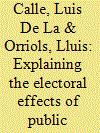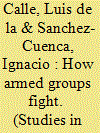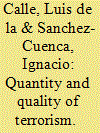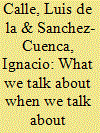|
|
|
Sort Order |
|
|
|
Items / Page
|
|
|
|
|
|
|
| Srl | Item |
| 1 |
ID:
094982


|
|
|
|
|
| Publication |
2010.
|
| Summary/Abstract |
According to the literature, governments have strong incentives to use the public budget tactically in order to either obtain the electoral support of new voters or strengthen the loyalty of their traditional supporters. Yet vote-seeking strategies only become rational when voters follow their self-interest and reward governments when their constituency benefits from public transfers. The literature has focused on the governments' incentives, largely ignoring the importance of knowing whether the electorate is responsive to public investments. This study tests empirically whether incumbents strategically use public investments to gather more electoral support; and whether voters take these investments into account at the polls. These two questions are pursued simultaneously by using as a case study the expansion of the underground network in Madrid, Spain. Only a little evidence is found to support the idea that regional governments constructed new metro stations in neighbourhoods where they had more to gain electorally. Also, the inauguration timing strictly followed the electoral cycle, something that indicates a strategic calculus on the part of the incumbent. However, the models are also consistent with the idea that the government's investments were primarily driven by motives of efficiency. Indeed, although governments are tempted to follow vote-seeking strategies, they are also aware that they cannot deviate too much from an efficiency-based allocation of public resources. From the perspective of the voters, robust evidence has been found to show that regional voters rewarded this policy at the neighbourhood level. Neighbourhoods that received new metro stations voted in higher numbers for the incumbent than those quarters without new investments. All in all, these findings may have some implications for normative democratic theory.
|
|
|
|
|
|
|
|
|
|
|
|
|
|
|
|
| 2 |
ID:
140786


|
|
|
|
|
| Summary/Abstract |
This article analyzes the choice of tactics by armed groups. We claim this choice is largely determined by the capacity of the rebel groups to control territory. Groups that are not able to liberate territory remain underground and have to rely mainly on bombings. Groups with territorial control engage in guerrilla-like attacks in which there is a physical encounter with the enemy. This conjecture is tested and largely confirmed at three levels: a cross-sectional analysis of the distribution of tactics in 122 armed groups, using compositional data analysis; a geographical analysis of the distribution of tactics in the largest cities as opposed to the rest of the country; and a case study of Hezbollah.
|
|
|
|
|
|
|
|
|
|
|
|
|
|
|
|
| 3 |
ID:
120321


|
|
|
|
|
| Publication |
2013.
|
| Summary/Abstract |
We deal in this article with the relationship between ETA attacks and electoral support for Batasuna, its political wing. We show that the relationship is twofold, since the geographical distribution of electoral support for the terrorists affects the location of ETA attacks, but violence also influences electoral support for the terrorist cause. On the one hand, when ETA chooses a location for its attacks, it takes into account the electoral strength of Batasuna. Our results show that the higher the vote for Batasuna in a municipality, the more likely members of the security forces will be killed there. With regard to the targeting of civilians, the relationship is curvilinear. ETA kills civilians in municipalities that are polarized, where support for Batasuna falls short of being hegemonic. On the other hand, our results also show that ETA attacks have an effect on the size of its support community. When ETA kills members of the security forces, voters punish the Batasuna party electorally. In the case of civilians, it depends on the specifics of the various campaigns. We find that when ETA kills informers and drug-dealers, the vote for Batasuna increases. ETA's killing of non-nationalist politicians, however, decreases Batasuna's vote share.
|
|
|
|
|
|
|
|
|
|
|
|
|
|
|
|
| 4 |
ID:
101438


|
|
|
|
|
| Publication |
2010.
|
| Summary/Abstract |
This article analyzes the electoral performance of the nationalist movement in Corsica. First, we ran an ecological analysis of a new dataset, including observations from all Corsican towns for all regional elections from 1992 to 2004. Second, we complemented the ecological findings with individual-level data. Our results show that the classical combination of economic-based and identity factors that account well for nationalist voting is conditioned in the Corsican case by the existence of two specific phenomena: the tendency of the nationalist movement to experience internal divisions and party splitting, and the extraordinary electoral resilience of local notables, the traditional French-loyal political leaders on the island.
|
|
|
|
|
|
|
|
|
|
|
|
|
|
|
|
| 5 |
ID:
102508


|
|
|
|
|
| Publication |
2011.
|
| Summary/Abstract |
This article presents a dataset of fatalities of domestic terrorism in Western European countries for the period 1965-2005. The Domestic Terrorism Victims (DTV) dataset, unlike others such as TWEED or GTD1, is based on local sources in each country and, consequently, it registers a higher number of killings. Measurement of the quantity of terrorism is therefore more accurate. The unit of observation is the fatality, not the attack, although the data can be transformed in terms of lethal attacks. Detailed information about each killing has been collected, making it possible to create new variables about the quality of violence: target selection, selectivity of the killings and their strategic aim. The ideology of the terrorists generates interesting variation in these three variables. The DTV is particularly suitable for hypothesis testing on the quantity and quality of terrorism.
|
|
|
|
|
|
|
|
|
|
|
|
|
|
|
|
| 6 |
ID:
113947


|
|
|
|
|
| Publication |
2012.
|
| Summary/Abstract |
The large-n literature on political violence has paid little attention to the distinction between insurgencies that control territory and those that do not. Territorial control has consequences for the lethality of the group, its pattern of recruitment and bargaining power. The main determinant of territorial control, we argue, is state capacity: while territorial insurgencies are more frequent in poor countries, nonterritorial ones tend to occur in countries with intermediate levels of development (rich countries are free of internal violence). The authors show that the relationship between development and nonterritorial violence is a concave one, using a panel for the period 1970-1997 that combines existing data sets on civil wars and the Global Terrorism Database 1. The authors also find that nonterritorial violence is more likely in democratic, old states. Population, rough terrain, and inequality have a similar impact on both types of conflict. The authors discuss to what extent territorial conflicts correspond to civil wars and nonterritorial ones to terrorism.
|
|
|
|
|
|
|
|
|
|
|
|
|
|
|
|
| 7 |
ID:
107994


|
|
|
|
|
| Publication |
2011.
|
| Summary/Abstract |
There is no consensus in the literature about the nature of terrorism. The authors' main claim is that this is ultimately the result of the coexistence of two senses of the term, the action and the actor sense, which are not fully congruent. Rather than trying to advocate a specific conceptualization, the authors provide in this article a map of the different ways in which scholars talk about terrorism. They identify first the set of terrorist actions and the set of terrorist actors. Terrorist tactics are a variety of the power to hurt, based on the lack of military power. Terrorist groups are underground ones with no territorial control. When the two criteria meet, the core of terrorism exists: coercive violence perpetrated by underground groups. The ambiguity that surrounds terrorism is caused by two other possibilities: actors with some measure of territorial control adopting coercive tactics and underground actors adopting military tactics. Although it is not possible to remove this ambiguity in empirical research, scholars can at least identify it and analyze it. The authors illustrate the two senses of terrorism and their interaction by using the most comprehensive dataset on terrorist incidents, the Global Terrorism Database (GTD).
|
|
|
|
|
|
|
|
|
|
|
|
|
|
|
|
|
|
|
|
|